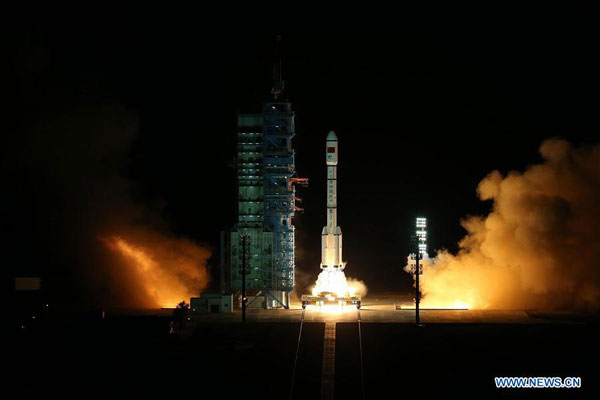

 |
| China launches space lab Tiangong-2 into space on Sept. 15, 2016, paving the way for a permanent space station the country plans to build around 2022. [Photo: Xinhua/Ju Zhenhua] |
The second meeting of the US-China Space Dialogue took place in Washington DC last week, as part of efforts to work around a US Congressional block to cooperation between the two countries’ space agencies.
The meeting was hosted by the US Department of State, involving representatives from the National Aeronautics and Space Administration (NASA), the National Oceanic and Atmospheric Administration, US Geological Survey, the Federal Aviation Administration, and the Department of Defense meeting with officials from the China National Space Administration (CNSA) on October 20.
The two sides exchanged updates on space policies and programs, discussed Earth and space science, space and terrestrial weather, tackling space debris and the long-term sustainability of outer space activities, according to a State Department media note.
Established in 2015, the dialogue, “enhances cooperation between the two countries, promotes responsible behavior in space, and encourages greater transparency and openness on a variety of space-related issues”, but few details of the meetings have been released.
Notably NASA Administrator Charles Bolden was in attendance, despite Congressional barriers to engaging Chinese state entities, with the Dialogue offering a way of working around such road blocks.
On the content of the dialogue, Mr Bolden stated in a blog piece posted on October 20 that he congratulated CNSA representative Tian Yulong on behalf of the NASA family on the recent launches of the Tiangong-2 space lab and Shenzhou-11 crewed mission – which later rendezvoused and docked in orbit – describing them as major milestones in China’s human space flight program.
From there, Mr Bolden went on to stress that NASA’s apparent human Journey to Mars requires collaboration with many nations, without specifically noting China. Earlier public statements indicate that he is a proponent of cooperation with China.
 Fire brigade in Shanghai holds group wedding
Fire brigade in Shanghai holds group wedding Tourists enjoy ice sculptures in Datan Town, north China
Tourists enjoy ice sculptures in Datan Town, north China Sunset scenery of Dayan Pagoda in Xi'an
Sunset scenery of Dayan Pagoda in Xi'an Tourists have fun at scenic spot in Nanlong Town, NW China
Tourists have fun at scenic spot in Nanlong Town, NW China Harbin attracts tourists by making best use of ice in winter
Harbin attracts tourists by making best use of ice in winter In pics: FIS Alpine Ski Women's World Cup Slalom
In pics: FIS Alpine Ski Women's World Cup Slalom Black-necked cranes rest at reservoir in Lhunzhub County, Lhasa
Black-necked cranes rest at reservoir in Lhunzhub County, Lhasa China's FAST telescope will be available to foreign scientists in April
China's FAST telescope will be available to foreign scientists in April "She power" plays indispensable role in poverty alleviation
"She power" plays indispensable role in poverty alleviation Top 10 world news events of People's Daily in 2020
Top 10 world news events of People's Daily in 2020 Top 10 China news events of People's Daily in 2020
Top 10 China news events of People's Daily in 2020 Top 10 media buzzwords of 2020
Top 10 media buzzwords of 2020 Year-ender:10 major tourism stories of 2020
Year-ender:10 major tourism stories of 2020 No interference in Venezuelan issues
No interference in Venezuelan issues
 Biz prepares for trade spat
Biz prepares for trade spat
 Broadcasting Continent
Broadcasting Continent Australia wins Chinese CEOs as US loses
Australia wins Chinese CEOs as US loses